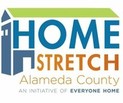Home Stretch Launches
After an extensive community process, Home Stretch has launched!
Home Stretch links homeless individuals with disabilities and their families to appropriate resources, services, and permanent housing based on their level of need and the length of time they have experienced homelessness.
Housing stability is vital to improving health outcomes and reducing health care costs. Alameda County, the State of California, and the federal Department of Housing and Urban Development have all established policies aimed at ensuring that people with the highest needs are prioritized to receive permanent supportive housing, which is permanent housing combined with the supports people need to maintain overall health and housing stability.
Home Stretch came into existence through a community planning process that began in 2014 under the umbrella of EveryOne Home, a collaborative established in 2008 to end homelessness in the County and supported by the Alameda County Board of Supervisors, all 14 cities in the County, and 70 nonprofit homeless and housing providers.
Home Stretch, which is a project of the Alameda County Health Care Services Agency in collaboration with EveryOne Home and partnering agencies, works by centralizing the process by which people access permanent supportive housing. Up to now, the County’s 1,800 permanent supportive housing units, operated by more than 20 entities, have been filled on a first-come-first-served basis or by lottery. People with the greatest needs have often been excluded, as they are often the least able to complete applications and take additional required steps when openings arise.
Home Stretch aims to remedy this and focus permanent supportive housing on the persons with the highest needs by building a registry of homeless individuals and heads of households with disabilities. Housing navigation services are being developed to assist the most vulnerable people who are not already linked to care. Home Stretch is working with permanent supportive housing providers to ensure that more and more permanent supportive housing vacancies are being filled through the registry.
The Home Stretch collaborative is committed to demonstrating effectiveness and making course corrections as needed. Key performance metrics have been developed and will be rolled out as the project matures.
You can find further information, including all the forms you need to refer someone to the Home Stretch registry, on the EveryOne Home website.
Please do not hesitate to contact the Home Stretch team at [email protected] or 510-891-8938 with any questions.
Home Stretch links homeless individuals with disabilities and their families to appropriate resources, services, and permanent housing based on their level of need and the length of time they have experienced homelessness.
Housing stability is vital to improving health outcomes and reducing health care costs. Alameda County, the State of California, and the federal Department of Housing and Urban Development have all established policies aimed at ensuring that people with the highest needs are prioritized to receive permanent supportive housing, which is permanent housing combined with the supports people need to maintain overall health and housing stability.
Home Stretch came into existence through a community planning process that began in 2014 under the umbrella of EveryOne Home, a collaborative established in 2008 to end homelessness in the County and supported by the Alameda County Board of Supervisors, all 14 cities in the County, and 70 nonprofit homeless and housing providers.
Home Stretch, which is a project of the Alameda County Health Care Services Agency in collaboration with EveryOne Home and partnering agencies, works by centralizing the process by which people access permanent supportive housing. Up to now, the County’s 1,800 permanent supportive housing units, operated by more than 20 entities, have been filled on a first-come-first-served basis or by lottery. People with the greatest needs have often been excluded, as they are often the least able to complete applications and take additional required steps when openings arise.
Home Stretch aims to remedy this and focus permanent supportive housing on the persons with the highest needs by building a registry of homeless individuals and heads of households with disabilities. Housing navigation services are being developed to assist the most vulnerable people who are not already linked to care. Home Stretch is working with permanent supportive housing providers to ensure that more and more permanent supportive housing vacancies are being filled through the registry.
The Home Stretch collaborative is committed to demonstrating effectiveness and making course corrections as needed. Key performance metrics have been developed and will be rolled out as the project matures.
You can find further information, including all the forms you need to refer someone to the Home Stretch registry, on the EveryOne Home website.
Please do not hesitate to contact the Home Stretch team at [email protected] or 510-891-8938 with any questions.
Meet Lora Ashworth, Home Stretch Program Manager!
Lora Ashworth joined Health Care for the Homeless in June 2016. Lora came to HCH from Abode Services, where she managed street outreach, medical, and permanent supportive housing programs for persons experiencing homelessness and served as a case manager.
Lora earned her MSW from UC Berkeley. In her spare time, Lora enjoys continuing her learning around best practices for serving vulnerable populations, spending time outdoors with her family, and pursuing her passion for creating music and art.
Lora looks forward to working closely with health care and housing providers to help the most vulnerable among us find stable housing. Lora can be reached at [email protected]
Lora earned her MSW from UC Berkeley. In her spare time, Lora enjoys continuing her learning around best practices for serving vulnerable populations, spending time outdoors with her family, and pursuing her passion for creating music and art.
Lora looks forward to working closely with health care and housing providers to help the most vulnerable among us find stable housing. Lora can be reached at [email protected]




